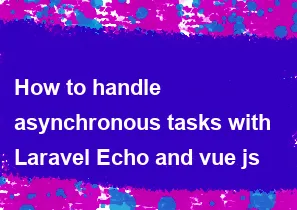How to handle asynchronous tasks with Laravel Echo and vue js

Laravel Echo is a package that provides an elegant interface for broadcasting events in a Laravel application. When combined with Vue.js, you can create real-time, reactive applications that update in response to server-side events. Here's a basic guide on how to handle asynchronous tasks with Laravel Echo and Vue.js:
Prerequisites:
Make sure you have Laravel Echo and the broadcasting features set up in your Laravel application. This usually involves configuring a broadcasting driver (like Pusher, Redis, etc.) and updating your
config/broadcasting.phpfile.Install and set up Laravel Echo and Vue.js in your project. You can use the following commands:
bash# Install Laravel Echo npm install --save laravel-echo pusher-js # Install Vue Echo npm install --save vue-echo-laravel
Steps:
1. Set up Laravel Echo
In your resources/js/bootstrap.js file, configure Laravel Echo:
jsimport Echo from 'laravel-echo';
window.Pusher = require('pusher-js');
window.Echo = new Echo({
broadcaster: 'pusher',
key: process.env.MIX_PUSHER_APP_KEY,
cluster: process.env.MIX_PUSHER_APP_CLUSTER,
// Add other options based on your configuration
});
Make sure to set your Pusher credentials in your .env file.
2. Set up Vue.js and Echo in a Component
Create a Vue.js component where you'll handle the asynchronous task. For example, in resources/js/components/AsyncTask.vue:
html<template>
<div>
<h1>{{ message }}</h1>
</div>
</template>
<script>
export default {
data() {
return {
message: 'Waiting for updates...',
};
},
mounted() {
// Listen for an event using Laravel Echo
window.Echo.channel('async-channel')
.listen('AsyncEvent', (event) => {
// Handle the event data
this.message = event.message;
});
},
};
</script>
3. Emit Events from Laravel
In your Laravel code, wherever you want to trigger the asynchronous task, emit an event. For example, in a controller:
phpuse App\Events\AsyncEvent;
public function triggerAsyncTask()
{
// Perform your asynchronous task here
// Broadcast an event
broadcast(new AsyncEvent('Task completed!'));
return response()->json(['message' => 'Task triggered successfully']);
}
4. Update routes/web.php
Define a route to trigger the asynchronous task:
phpuse App\Http\Controllers\YourController;
Route::get('/trigger-async-task', [YourController::class, 'triggerAsyncTask']);
5. Include the Component in a Blade File
Include your Vue component in a Blade file:
blade@extends('layouts.app') @section('content') <async-task></async-task> @endsection
6. Run Laravel Mix
Finally, run Laravel Mix to compile your assets:
bashnpm run dev
Now, when you visit your route (e.g., /trigger-async-task), the asynchronous task will be triggered, and the Vue component will update in real-time when the event is received through Laravel Echo.
-
Popular Post
- How to optimize for Google's About This Result feature for local businesses
- How to implement multi-language support in an Express.js application
- How to handle and optimize for changes in mobile search behavior
- How to handle CORS in a Node.js application
- How to use Vue.js with a UI framework (e.g., Vuetify, Element UI)
- How to configure Laravel Telescope for monitoring and profiling API requests
- How to create a command-line tool using the Commander.js library in Node.js
- How to implement code splitting in a React.js application
- How to use the AWS SDK for Node.js to interact with various AWS services
- How to use the Node.js Stream API for efficient data processing
- How to implement a cookie parser middleware in Node.js
- How to implement WebSockets for real-time communication in React
-
Latest Post
- How to implement a dynamic form with dynamic field styling based on user input in Next.js
- How to create a custom hook for handling user interactions with the browser's device motion in Next.js
- How to create a custom hook for handling user interactions with the browser's battery status in Next.js
- How to implement a dynamic form with dynamic field visibility based on user input in Next.js
- How to implement a dynamic form with real-time collaboration features in Next.js
- How to create a custom hook for handling user interactions with the browser's media devices in Next.js
- How to use the useSWRInfinite hook for paginating data with a custom loading indicator in Next.js
- How to create a custom hook for handling user interactions with the browser's network status in Next.js
- How to create a custom hook for handling user interactions with the browser's location in Next.js
- How to implement a dynamic form with multi-language support in Next.js
- How to create a custom hook for handling user interactions with the browser's ambient light sensor in Next.js
- How to use the useHover hook for creating interactive image zoom effects in Next.js